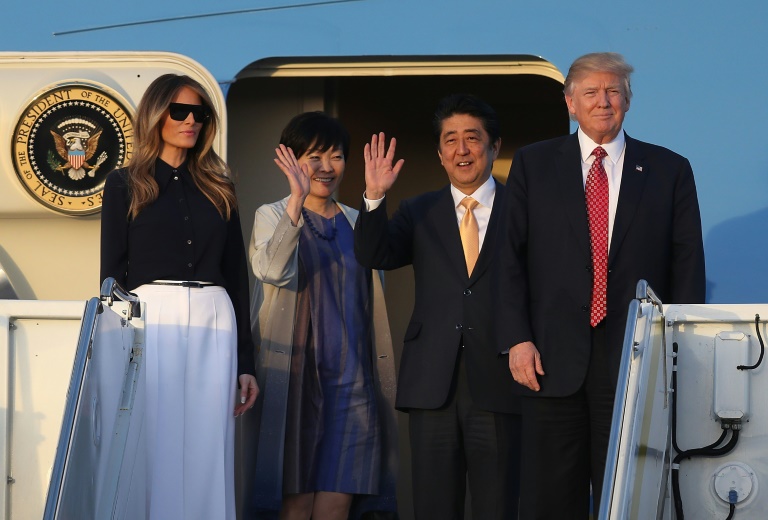Trump and his wife Melania tossed flower petals into the waters of the USS Arizona memorial, later taking part in a wreath-laying ceremony to honor soldiers who died in a Japanese surprise attack in 1941 that triggered the US entry into World War II.
But it was the threat of conflict with another East Asian power that was set to dominate talks on the almost two-week trip that takes him from Japan to South Korea, China, Vietnam and finally the Philippines.
Months of verbal escalation between Washington and Pyongyang have raised the specter of nuclear war, and left allies South Korea fearing the US president’s propensity to veer off script and launch into fiery tirades may worsen the situation.
Trump is also seeking to leave behind domestic woes, including recent developments into the probe on Russian election meddling, as he holds closely-watched meetings with leaders ranging from powerful Chinese counterpart Xi Jinping to controversial Philippines strongman Rodrigo Duterte.
Trump told reporters it was “very special being in Hawaii,” later tweeting: “Remember #PearlHarbor. Remember the @USSArizona!”
– Golf diplomacy –

US President Donald Trump joins his “friend” Shinzo Abe on Sunday a new round of golf — following the one they shared in Florida last February — before a series of meetings aimed at underscoring the strength of the US-Japanese alliance
He joins his “friend” Shinzo Abe on Sunday a new round of golf — following the one they shared in Florida last February — before a series of meetings aimed at underscoring the strength of the US-Japanese alliance.
Abe is riding high after seizing a “super-majority” in Japan’s parliament following a snap election, and has vowed to push to amend the country’s pacifist constitution.
In South Korea, Trump — unlike many of his predecessors — will not travel to the Demilitarized Zone dividing the Korean peninsula. Instead he will deliver what is set to be a closely-scrutinized speech before the country’s national assembly.
Seoul will be hoping during Trump’s two-day visit starting Tuesday for a reaffirmation of its alliance with Washington, at a time when the North is pushing ahead with its nuclear and ballistic missile programs in defiance of the international community.
There is widespread concern in South Korea that Trump’s visit might worsen the situation if he fails to dampen his fierce rhetoric.
“Because of his tendency to veer off the script, many Koreans are worried that he may let loose”, Professor Yang Moo-Jin of the University of North Korean Studies told AFP.
Some 500 protesters took to the streets in Seoul Saturday, chanting slogans and waving banners as they accused Trump of bringing the Korean peninsula to the brink of war.
After Seoul, the 45th US president heads to Beijing next Wednesday to meet his counterpart Xi Jinping just weeks after he was formally handed a second term in power, solidifying his grip on the world’s most populous nation.
As a candidate Trump railed against China’s trade imbalance with the United States, but after gaining power has been carefully in dealing with the Asian giant.
Analysts predict Xi will grant Trump a lavish welcome but few concessions.
Trump will round off his trip with a visit to Vietnam, where at an APEC summit he will deliver his vision for a “free and open Indo-Pacific region” — remarks eagerly awaited by the business community following the president’s rejection of the Trans-Pacific Partnership on his first day in office.
Trump will wrap up his trip in Manila on November 12-13, taking part in a summit of South East Asian leaders, and will hold what could turn out to be a colorful one-on-one with the outspoken Philippine leader Rodrigo Duterte
He will wrap up his trip in Manila on November 12-13, taking part in a summit of South East Asian leaders, and will hold what could turn out to be a colorful one-on-one with the outspoken Duterte.
Both men have shocked with their use of threatening language. Trump has even praised Duterte for doing an “unbelievable job on the drug problem” — despite warnings from rights groups of death squad-style killings
Download our app and read this and other great stories on the move. Available for Android and iOS.